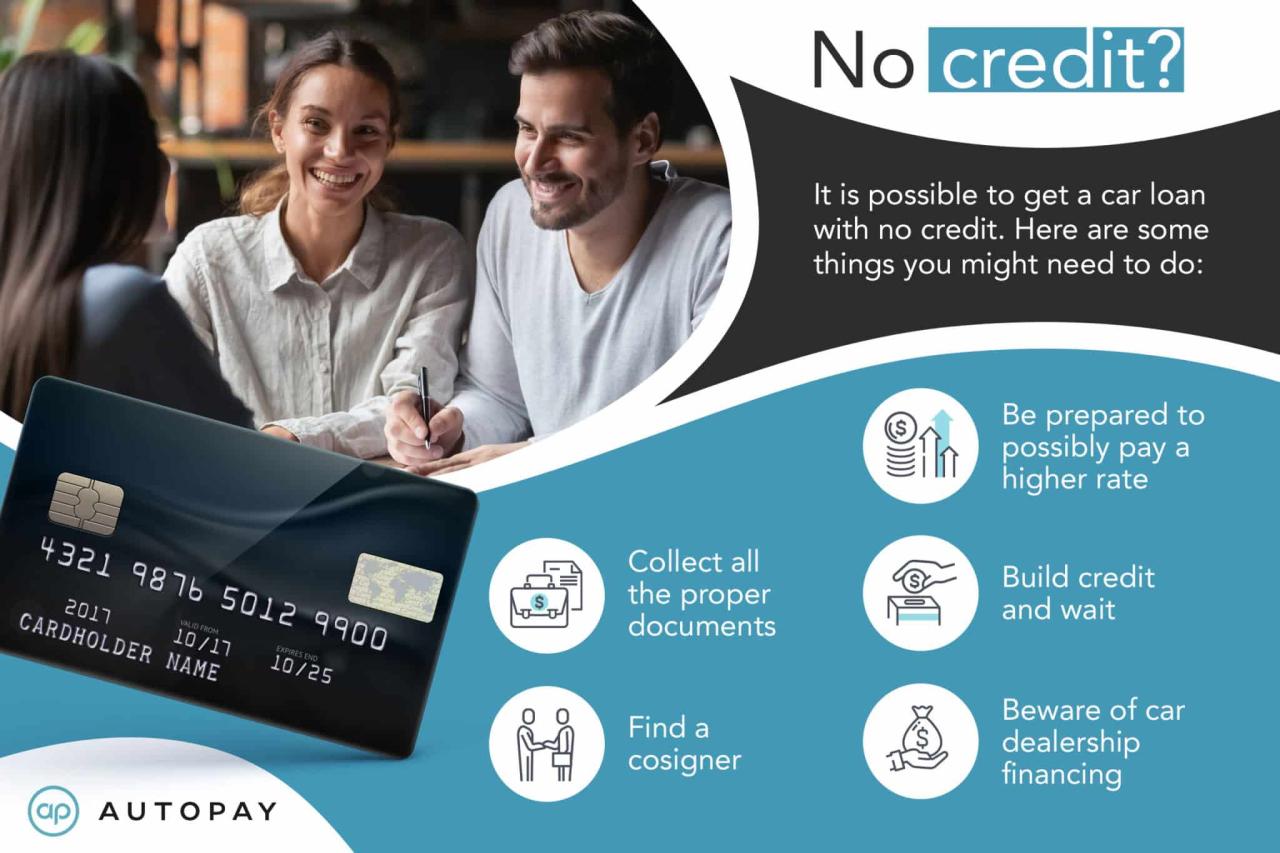Understanding Credit and Financing

Securing a car loan without a robust credit history can be challenging, but understanding the intricacies of credit and financing is the first step towards success. This section will clarify the role of credit in car financing, detail the loan options available, and illustrate the impact of credit scores on interest rates and loan terms.
Credit History’s Importance in Car Financing, How to get a car financed with no credit
Your credit history acts as a financial report card, summarizing your past borrowing and repayment behavior. Lenders use this information to assess your creditworthiness – your ability to repay a loan. A strong credit history, demonstrated by consistent on-time payments and responsible credit use, signals low risk to lenders, leading to more favorable loan terms. Conversely, a poor or nonexistent credit history indicates higher risk, potentially resulting in higher interest rates, stricter loan requirements, or even loan denial. Building a positive credit history takes time and responsible financial management, but it significantly impacts your ability to secure favorable financing options.
Types of Car Loans
Several types of car loans cater to different needs and financial situations. These include direct loans from banks or credit unions, indirect loans facilitated through dealerships, and loans specifically designed for borrowers with limited or no credit history. Direct loans often offer more transparency and potentially better rates, while indirect loans can streamline the process through the dealership. Loans for those with no credit may have higher interest rates but provide an opportunity to establish credit. The best option depends on individual circumstances and financial goals.
Interest Rate Comparison: Credit Scores and Loan Costs
Interest rates significantly impact the overall cost of a car loan. Borrowers with excellent credit scores typically qualify for lower interest rates, reflecting the lower perceived risk. Conversely, individuals with no credit or poor credit often face significantly higher interest rates. For example, a borrower with a credit score above 750 might secure a loan at 4% interest, while someone with no credit might face an interest rate of 15% or even higher. This substantial difference underscores the importance of building and maintaining a good credit history.
Loan Term Comparison by Credit Score
The following table illustrates how credit scores affect loan terms, including loan length, interest rates, and resulting monthly payments. These are illustrative examples and actual rates may vary depending on the lender, loan amount, and other factors.
| Credit Score | Loan Length (Years) | Interest Rate (%) | Monthly Payment (on a $20,000 loan) |
|---|---|---|---|
| 750+ (Excellent) | 60 | 4 | $366 |
| 650-749 (Good) | 60 | 6 | $387 |
| 600-649 (Fair) | 60 | 9 | $420 |
| Below 600 (Poor/No Credit) | 48 | 15 | $517 |
Negotiating with Dealerships

Securing a car loan with no credit history requires skillful negotiation. Dealerships are businesses, and their primary goal is profit. Understanding this dynamic is crucial for achieving favorable loan terms. Effective negotiation involves preparation, research, and a clear understanding of your financial capabilities.
Negotiating favorable loan terms involves several key strategies. A well-prepared buyer can significantly impact the final cost of the vehicle and the overall loan agreement. This section details effective techniques and examples to help you navigate this process successfully.
Effective Negotiation Strategies
Successful negotiation hinges on preparedness. Before entering a dealership, know your budget, research vehicle prices, and pre-qualify for a loan from a credit union or bank. This strengthens your position and allows you to compare offers. Armed with this information, you can confidently counter-offer and negotiate interest rates and loan terms. Remember, a lower interest rate translates to substantial savings over the life of the loan. For example, a 1% reduction on a $20,000 loan over 60 months could save you hundreds of dollars.
Questions to Ask About Financing
Asking the right questions is critical. Dealerships may present different financing options, some potentially more beneficial than others. Examples of pertinent questions, rephrased as informative statements, include: The dealership offers various financing plans with varying interest rates and terms. The available loan terms, including repayment periods, are clearly explained. The dealership provides a comprehensive breakdown of all fees associated with the loan, including origination fees and prepayment penalties. The dealership’s financing options are compared to those offered by external lenders, allowing for informed decision-making. A detailed explanation of the loan’s APR (Annual Percentage Rate) is provided, along with a clear understanding of what factors contribute to this rate.
Comparing Offers from Multiple Dealerships
Comparing offers is essential. Different dealerships may offer varying interest rates and loan terms. By obtaining multiple quotes, you can identify the most favorable deal. This competitive approach helps ensure you secure the best possible financing for your purchase. For instance, one dealership might offer a slightly higher interest rate but a lower down payment requirement, which could be more suitable depending on your financial situation. Consider all aspects of each offer before making a final decision.
Understanding and Interpreting Loan Documents
Loan documents contain crucial information. Thoroughly review all documents before signing. Pay close attention to the interest rate, loan term, monthly payment amount, and any additional fees. If anything is unclear, ask for clarification. Misunderstanding the terms could lead to financial difficulties down the line. It’s advisable to have someone with financial expertise review the documents with you if you’re unsure about any aspect.
Sample Negotiation Script for a Lower Interest Rate
A sample negotiation script could include the following: “I’ve been pre-approved for a loan with a 7% interest rate from [Credit Union/Bank Name]. While I appreciate your offer, I was hoping to secure a rate closer to that figure. Could you match or improve upon this rate to finalize the purchase today?” This approach demonstrates your preparedness and willingness to negotiate, potentially leading to a more favorable outcome. Remember, a polite but firm approach is key. If the initial offer isn’t satisfactory, be prepared to walk away.
Illustrative Examples: How To Get A Car Financed With No Credit

Understanding the process of securing car financing with no credit or poor credit is best illustrated through real-world examples. These scenarios highlight the steps involved, challenges faced, and potential solutions for navigating the complexities of the automotive financing landscape.
Successful Car Purchase with No Credit History
A Successful Financing Scenario
Imagine Sarah, a recent college graduate with no credit history, seeking to purchase a reliable used car for commuting to her new job. She identified a 2015 Honda Civic with 60,000 miles for $12,000 at a local dealership. Knowing her lack of credit history would be a hurdle, Sarah meticulously prepared. She saved a substantial down payment of $3,000, demonstrating her financial responsibility. She also obtained a letter from her employer confirming her stable employment and income. Armed with this information, Sarah visited several dealerships, comparing offers and interest rates. She ultimately secured a loan from a credit union specializing in loans for individuals with limited or no credit history. The loan terms were a 48-month loan with a 9% interest rate, resulting in a monthly payment of approximately $200. This example demonstrates that with careful planning, a significant down payment, and diligent research, it is possible to overcome the challenge of securing financing with no credit history.
A Challenging Financing Scenario
Conversely, consider Mark, who has a poor credit history due to past financial difficulties. He needs a car for his job, but his credit score significantly impacts his financing options. He attempted to secure a loan for a $15,000 used sedan, but was repeatedly rejected due to his low credit score. Dealerships offered loans with extremely high interest rates (above 20%), resulting in unaffordable monthly payments. Mark’s poor credit history limited his choices and resulted in significantly higher financing costs. He could explore solutions such as improving his credit score through responsible credit management (paying bills on time, lowering credit utilization), securing a co-signer with good credit, or exploring alternative financing options like buy-here-pay-here dealerships (although these often come with higher interest rates). This scenario underscores the importance of maintaining a good credit history and the significant financial implications of poor credit.

Tim Redaksi